Recent Storm Damage Posts
Tropical Storm Clean-up and Restoration
7/25/2023 (Permalink)
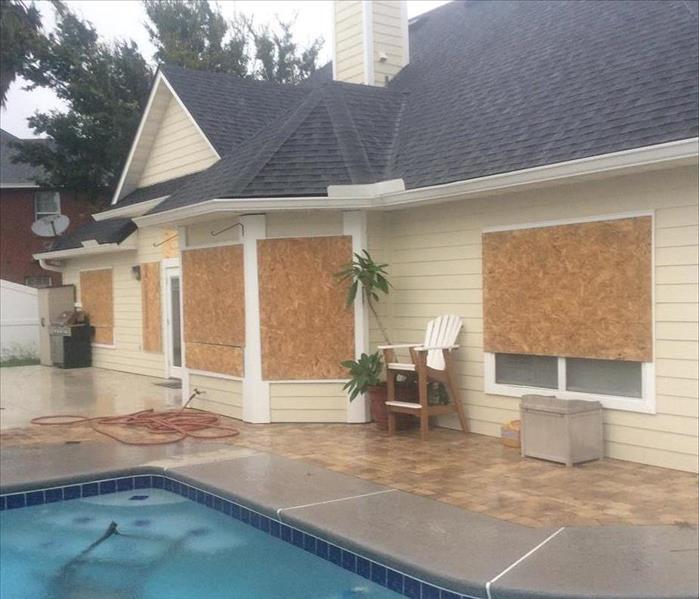 SERVPRO of Jacksonville Beach/Ponte Vedra offers tips for storm clean-up and restoration.
SERVPRO of Jacksonville Beach/Ponte Vedra offers tips for storm clean-up and restoration.
From time to time, you may have experienced water damage to your home or business from a leaky roof or a broken pipe. If you’ve suffered a loss due to a tropical storm, however, there are many factors that can make recovery and restoration more complicated than a leaking faucet.
A tropical storm or hurricane can cause damage from wind, rising water, falling trees, and flying debris. Recovery from any or all of these can be difficult, but there are some tips for you to follow after the storm has passed.
- If you’ve left the home to seek safer shelter, you need to be careful when returning home. First, make sure the local authorities have announced that it’s safe to return.
- You may have lost power or other utilities, so bring necessities like food and water with you.
- Have a professional check for damage to your home, to make sure it’s safe. If necessary, you may have to board up damaged windows or doors until repairs can be made.
- Avoid roads that are covered with water while you’re coming home and stay away from any downed power lines you may encounter.
- If you’re going to use a generator, make sure it’s in an area with plenty of ventilation, and never inside a garage.
- In case of possible gas leaks, you should use flashlights instead of candles.
- Check the food in your fridge for spoilage, and discard anything you’re not absolutely sure about
- Keep children and pets inside until things are back to normal.
- Contact your insurance company as soon as possible to start the claims process. You may find mobile emergency claims centers set up in mall or grocery store parking lots.
Hurricanes and tropical storms pack powerful wind and heavy rain that can cause significant damage to your property. After the storm has passed, you need help to clean up and repair your property so you can return back to normal as quickly as possible. At SERVPRO of Jacksonville Beach/Ponte Vedra, we understand that dealing with a disaster can be overwhelming, and our goal is to help make the restoration process as smooth and stress free as possible by providing a prompt response. In addition, we will work directly with your insurance company.
We are a locally owned and operated small business and have a team of highly trained technicians that are dedicated to responding quickly to any size disaster. We provide 24-hour emergency service to the Jacksonville and St. Johns County beaches, including Atlantic Beach, Neptune Beach, Jacksonville Beach or Ponte Vedra Beach, and have the training and expertise to handle your restoration and cleaning needs. Not only are we an IICRC (Institute of Inspection Cleaning and Restoration Certified) Firm, but all of our technicians, members of our office staff and business development teams are individually trained and IICRC certified as well.
For additional information about our company, visit our website or call us at 904-246-6118.
What To Do With Damage That's Not Covered By Insurance
5/23/2023 (Permalink)
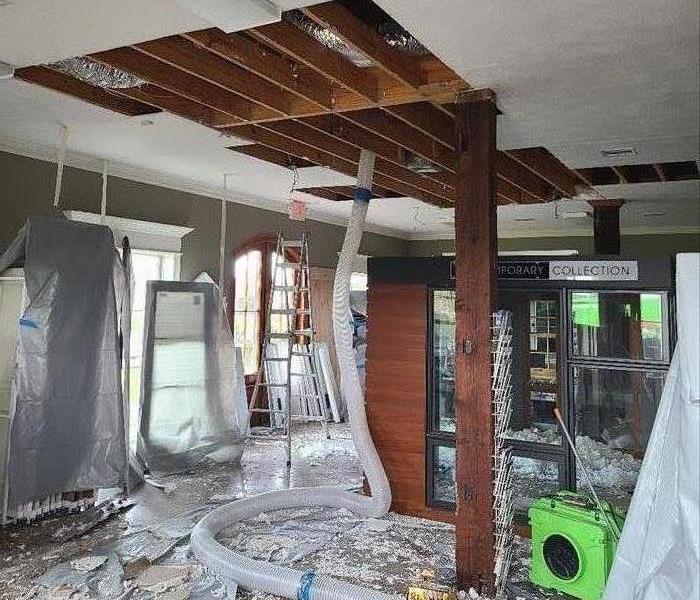 SERVPRO of Jacksonville Beach/Ponte Vedra provides help with storm damage not covered by insurance.
SERVPRO of Jacksonville Beach/Ponte Vedra provides help with storm damage not covered by insurance.
Damage That's Not Covered By Insurance
We Provide Help With Damage Not Covered By Insurance in Jacksonville, FL. If you've suffered storm damage, fire damage, mold, or water damage that isn’t covered by your insurance policy, here are some steps you can take to recover.
SERVPRO of Jacksonville Beach / Ponte Vedra Can Help
Damage to your home can be a stressful experience, particularly if it's not covered by insurance. While you may feel tempted to try and fix the damage yourself, it's important to remember that some repairs can be dangerous and should only be attempted by a professional. In this blog post, we'll go over what you can do if damage to your home is not covered by insurance.
FEMA Disaster Grants
FEMA offers grants to help homeowners and renters recover from disasters. These grants are not loans and do not need to be repaid. FEMA disaster grants can help pay for temporary housing, home repairs, uninsured and underinsured personal property losses, and other serious disaster-related expenses.
Partner With a Reputable Restoration Company
Homeowners insurance is vital in protecting your wallet should disaster strike your home. However, some damages may not be covered by your policy. Water damage is a common issue that homeowners face that is often not fully covered by insurance. If you experience water damage in your home, it's important to partner with a reputable restoration company that can help you navigate the process, even if your insurance doesn't cover everything.
What Does Homeowners Insurance Cover?
Homeowners insurance is a type of property insurance that covers a private residence. The policy provides financial protection against loss from events such as fire, theft, or weather damage. It also covers liability for injuries that occur on the property.
Most homeowner's policies include four types of coverage: dwelling coverage, personal property coverage, liability coverage, and medical payments coverage.
- Dwelling coverage protects the structure of the home.
- Personal property coverage protects the belongings inside the home.
- Liability coverage protects the policyholder from lawsuits resulting from injuries or damage that they or their family members have caused.
- Medical payments coverage pays for medical expenses related to injuries that occur on the property.
It’s important to know that homeowners' insurance policies can be customized to fit the needs of the policyholder, and additional coverage can be purchased for extra protection.
Contact SERVPRO to Schedule a Consultation
SERVPRO of Jacksonville Beach/Ponte Vedra is here for our customers and community. We want to provide the best service possible and hope that doing so will help our community. If you need our services for repair or remediation, please do not hesitate to contact us for more information or to schedule a consultation. Our team would be happy to assist you.
Preparing for a Hurricane to Limit Home Damage and Keep Your Family Safe
5/22/2023 (Permalink)
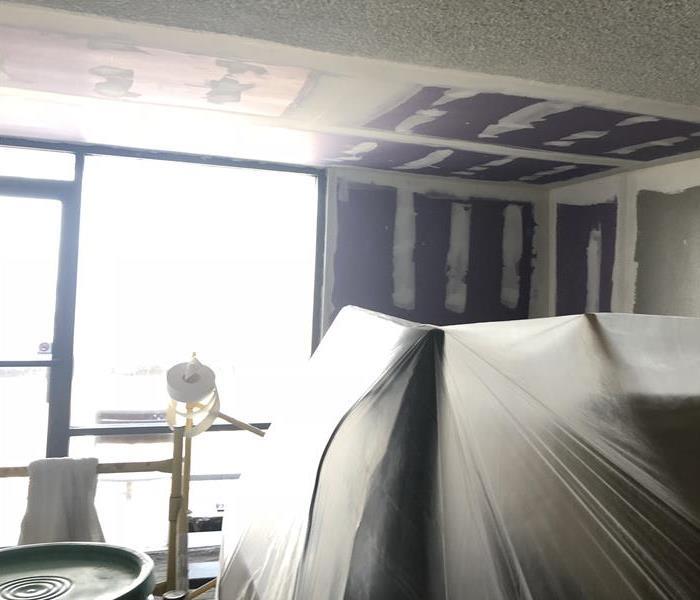 SERVPRO of Jacksonville Beach/Ponte Vedra offers tips for hurricane preparedness to limit hurricane damage to your home.
SERVPRO of Jacksonville Beach/Ponte Vedra offers tips for hurricane preparedness to limit hurricane damage to your home.
Hurricane season is upon us. Are you ready? It’s important to prepare you home and family to limit the hurricane damage your property sustains and keep your family safe. Here, we’ll discuss hurricane preparedness and offer some tips for getting ready for a big storm.
- Make some plans. You’ll need an evacuation plan, listing different evacuation destinations and an emergency pack list, as well as phone numbers for emergency contacts. Make sure your family is familiar with the plan, and perform evacuation drills if you feel it’s necessary. You’ll also need a hurricane preparedness list of the supplies you’ll need to have on hand during a storm. This list should include seven days’ worth of non-perishable food and bottled water, tools, flashlights, a radio, and extra batteries, clothes, bedding, plasticware, a waterproof container with important documents, games and comfort items, and first aid supplies, including prescription medication and personal hygiene items.
- Take stock of your possessions. Do a complete inventory of your home before a hurricane hits, so you’ll be ready if you need to file an insurance claim or apply for disaster aid. It’s important to review your insurance policy, also, so that you can make any necessary adjustments to ensure that you’re covered if a hurricane hits.
- Secure your home’s exterior before a storm. Hurricanes come with high winds that can send just about anything flying through your windows and doors. Secure your windows, sliding glass doors, and entry doors with plywood or hurricane shutters to prevent breakage and interior damage. Keep wind and water out of the house by sealing exterior vents with marine-grade plywood, installing covers on outdoor electrical outlets, putting bibs on garden spigots, and caulking around cables and pipes that penetrate the exterior wall of the house. Consider installing roof straps and reinforcing your garage door as well. Make a thorough inspection to determine if there’s anything that could become airborne, including furniture, planters, bikes, toys, and other outdoor items. Move these to a secure location and trim trees and branches so they won’t break off during a storm. If you have a pool, cover it and secure the cover, and if you have a shed, make sure the door is closed and secure. Check your foundation and repair cracks, cover your outside HVAC components, and if you have a sump pump, test it to make sure it’s working properly.
- Get the interior ready as well. Carefully check wall hangings to confirm that they’re secure and take any outdoor art inside. Turn your refrigerator to the coldest setting to prevent spoilage in case of a power outage and remove fuses from your air conditioner to protect it from damage. If you need to evacuate, unplug all of your major appliances, and move small electronics like televisions, vacuums, and stereos to a higher floor. Turn off the main water valve to the home, cut off the electricity at the circuit breaker, and turn off the gas at each appliance.
- Care for your cars. Fill the gas tanks and move your cars to higher ground or into your garage and away from trees and power lines.
If your Northeast Florida home is damaged in a hurricane or tropical storm, call SERVPRO of The Beaches/Ponte Vedra. Our highly trained restoration technicians have the experience and equipment to restore your Jacksonville, Jacksonville Beach, or Ponte Vedra home to its pre-storm condition. A trusted leader in the water restoration industry, we’ve served our community for more than 40 years. Call (904) 246-6118 or contact us through our website.
Preparing for a Hurricane to Limit Home Damage and Keep Your Family Safe
5/17/2023 (Permalink)
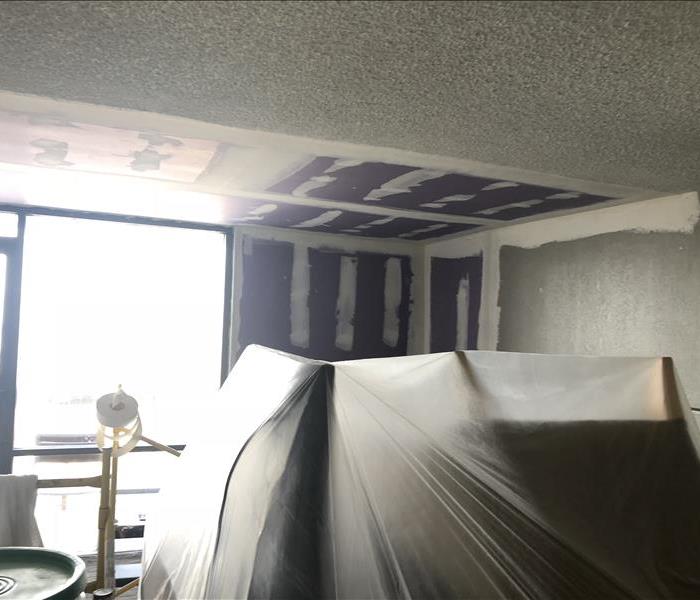 SERVPRO of Jacksonville Beach/Ponte Vedra offers tips for hurricane preparedness to limit hurricane damage to your home.
SERVPRO of Jacksonville Beach/Ponte Vedra offers tips for hurricane preparedness to limit hurricane damage to your home.
Hurricane season is upon us. Are you ready? It’s important to prepare you home and family to limit the hurricane damage your property sustains and keep your family safe. Here, we’ll discuss hurricane preparedness and offer some tips for getting ready for a big storm.
- Make some plans. You’ll need an evacuation plan, listing different evacuation destinations and an emergency pack list, as well as phone numbers for emergency contacts. Make sure your family is familiar with the plan and perform evacuation drills if you feel it’s necessary. You’ll also need a hurricane preparedness list of the supplies you’ll need to have on hand during a storm. This list should include seven days’ worth of non-perishable food and bottled water, tools, flashlights, a radio, and extra batteries, clothes, bedding, plasticware, a waterproof container with important documents, games and comfort items, and first aid supplies, including prescription medication and personal hygiene items.
- Take stock of your possessions. Do a complete inventory of your home before a hurricane hits, so you’ll be ready if you need to file an insurance claim or apply for disaster aid. It’s important to review your insurance policy, also, so that you can make any necessary adjustments to ensure that you’re covered if a hurricane hits.
- Secure your home’s exterior before a storm. Hurricanes come with high winds that can send just about anything flying through your windows and doors. Secure your windows, sliding glass doors, and entry doors with plywood or hurricane shutters to prevent breakage and interior damage. Keep wind and water out of the house by sealing exterior vents with marine-grade plywood, installing covers on outdoor electrical outlets, putting bibs on garden spigots, and caulking around cables and pipes that penetrate the exterior wall of the house. Consider installing roof straps and reinforcing your garage door as well. Make a thorough inspection to determine if there’s anything that could become airborne, including furniture, planters, bikes, toys, and other outdoor items. Move these to a secure location and trim trees and branches so they won’t break off during a storm. If you have a pool, cover it and secure the cover, and if you have a shed, make sure the door is closed and secure. Check your foundation and repair cracks, cover your outside HVAC components, and if you have a sump pump, test it to make sure it’s working properly.
- Get the interior ready as well. Carefully check wall hangings to confirm that they’re secure and take any outdoor art inside. Turn your refrigerator to the coldest setting to prevent spoilage in case of a power outage and remove fuses from your air conditioner to protect it from damage. If you need to evacuate, unplug all of your major appliances, and move small electronics like televisions, vacuums, and stereos to a higher floor. Turn off the main water valve to the home, cut off the electricity at the circuit breaker, and turn off the gas at each appliance.
- Care for your cars. Fill the gas tanks and move your cars to higher ground or into your garage and away from trees and power lines.
If your Northeast Florida home is damaged in a hurricane or tropical storm, call SERVPRO of The Beaches/Ponte Vedra. Our highly trained restoration technicians have the experience and equipment to restore your Jacksonville, Jacksonville Beach, or Ponte Vedra home to its pre-storm condition. A trusted leader in the water restoration industry, we’ve served our community for more than 40 years. Call (904) 246-6118 or contact us through our website.
What To Do With Damage That's Not Covered By Insurance
4/12/2023 (Permalink)
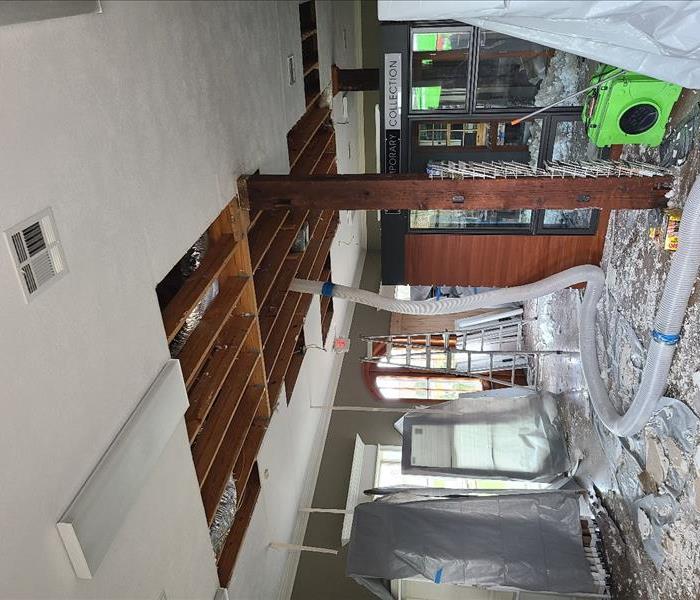 SERVPRO of Jacksonville Beach/Ponte Vedra provides help with storm damage not covered by insurance.
SERVPRO of Jacksonville Beach/Ponte Vedra provides help with storm damage not covered by insurance.
Damage That's Not Covered By Insurance
We Provide Help With Damage Not Covered By Insurance in Jacksonville, FL. If you've suffered storm damage, fire damage, mold, or water damage that isn’t covered by your insurance policy, here are some steps you can take to recover.
SERVPRO of Jacksonville Beach / Ponte Vedra Can Help
Damage to your home can be a stressful experience, particularly if it's not covered by insurance. While you may feel tempted to try and fix the damage yourself, it's important to remember that some repairs can be dangerous and should only be attempted by a professional. In this blog post, we'll go over what you can do if damage to your home is not covered by insurance.
FEMA Disaster Grants
FEMA offers grants to help homeowners and renters recover from disasters. These grants are not loans and do not need to be repaid. FEMA disaster grants can help pay for temporary housing, home repairs, uninsured and underinsured personal property losses, and other serious disaster-related expenses.
Partner With a Reputable Restoration Company
Homeowners insurance is vital in protecting your wallet should disaster strike your home. However, some damages may not be covered by your policy. Water damage is a common issue that homeowners face that is often not fully covered by insurance. If you experience water damage in your home, it's important to partner with a reputable restoration company that can help you navigate the process, even if your insurance doesn't cover everything.
What Does Homeowners Insurance Cover?
Homeowners insurance is a type of property insurance that covers a private residence. The policy provides financial protection against loss from events such as fire, theft, or weather damage. It also covers liability for injuries that occur on the property.
Most homeowner's policies include four types of coverage: dwelling coverage, personal property coverage, liability coverage, and medical payments coverage.
- Dwelling coverage protects the structure of the home.
- Personal property coverage protects the belongings inside the home.
- Liability coverage protects the policyholder from lawsuits resulting from injuries or damage that they or their family members have caused.
- Medical payments coverage pays for medical expenses related to injuries that occur on the property.
It’s important to know that homeowners' insurance policies can be customized to fit the needs of the policyholder, and additional coverage can be purchased for extra protection.
Contact SERVPRO to Schedule a Consultation
SERVPRO of Jacksonville Beach/Ponte Vedra is here for our customers and community. We want to provide the best service possible and hope that doing so will help our community. If you need our services for repair or remediation, please do not hesitate to contact us for more information or to schedule a consultation. Our team would be happy to assist you.
Steps to Take After Storm Damage
1/12/2022 (Permalink)
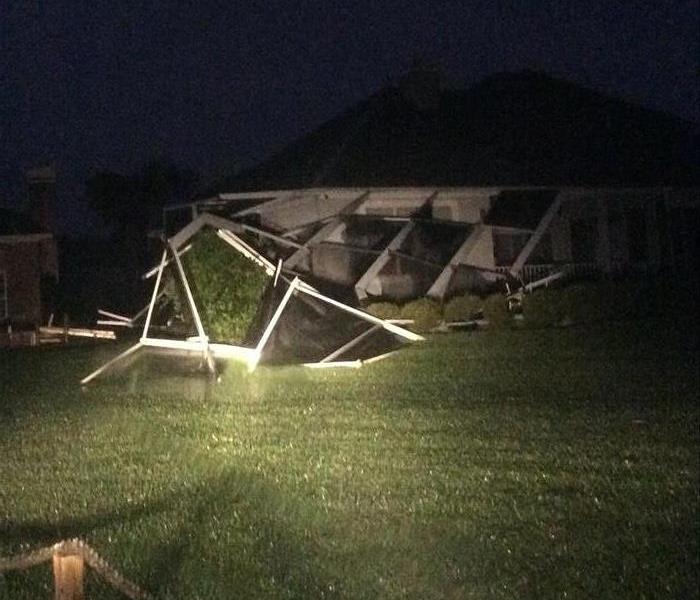 SERVPRO of Jacksonville Beach/Ponte Vedra is ready to help restore your home and get everything back to like-new condition!
SERVPRO of Jacksonville Beach/Ponte Vedra is ready to help restore your home and get everything back to like-new condition!
Steps to Take After Storm Damage
A major storm can be devastating. If you personally experience one or choose to ride it out, you may be wondering what to do next. Here are some suggestions.
Safety First
Is everyone safe? If anyone needs medical attention, call 911. If not, carefully and slowly assess the home and grounds for broken glass, splintered wood, exposed nails, or anything else that can cause injuries. Be very careful moving anything, wearing work gloves if possible. Shut off all gas valves if you smell gas. If you see a power line down, stay far from it and report it to the police or your power company.
Record the Damage
Take photographs of the damage. This serves two purposes. First, it helps you show your insurance company and restoration company the extent of the damage. Second, it helps you contemplate the damage after you leave the building.
Here are a few things you may want to focus your photography on:
- Damaged windows and doors
- Roof damage - tree limbs and other debris, standing water, damage to tiles or shingles, gutters and downspouts
- Damage to HVAC components such as exterior heat pumps
- Basement flooding
- Water intrusion in the attic/ wet insulation
- Damage to exterior siding
- Burn marks that may have been caused by water infiltrating electrical outlets or cords, or by downed power lines
- Damage to computers, printers, televisions, speakers or other electronic equipment
Call Your Insurance Company
As soon as you can, call your insurance company or agent and tell them all you can about the damage. Tell them you have photos that you can send them. They will eventually send out an adjuster to assess the damages. Read your policy and ask questions about what is covered and the timeframe of your compensation. Remember that storm damage is covered by most residential and commercial insurance policies but flood insurance is a separate policy. They can also give you contact information for trusted contractors and help you avoid unscrupulous ones. Your insurance company can tell you if any aspect of your damage is covered by federal emergency aid programs as well. Keep any receipts related to the storm damage so that you can seek reimbursement.
Avoid Further Damages
To avoid storm damage getting worse, remove vulnerable items (especially electronics, wood furniture, etc.) from standing water and put them somewhere they’re more likely to dry out quickly. Hang up rugs. Carpets with extensive water damage will probably need to be replaced. As soon as you can, call a water clean-up and restoration company. They have special equipment, experience and methods to stop further damage and begin the restoration process immediately.
If your northeast Florida home or business has suffered storm damage, call SERVPRO of Jacksonville Beach/Ponte Vedra. Our highly-trained restoration technicians have the experience and equipment to restore your Atlantic Beach, Neptune Beach, Jacksonville Beach, or Ponte Vedra home and get everything back to like-new condition. A trusted leader in the industry, we’ve served our community for more than 40 years. Call (904) 246-6118.
Remodeling after Storm Damage
1/6/2022 (Permalink)
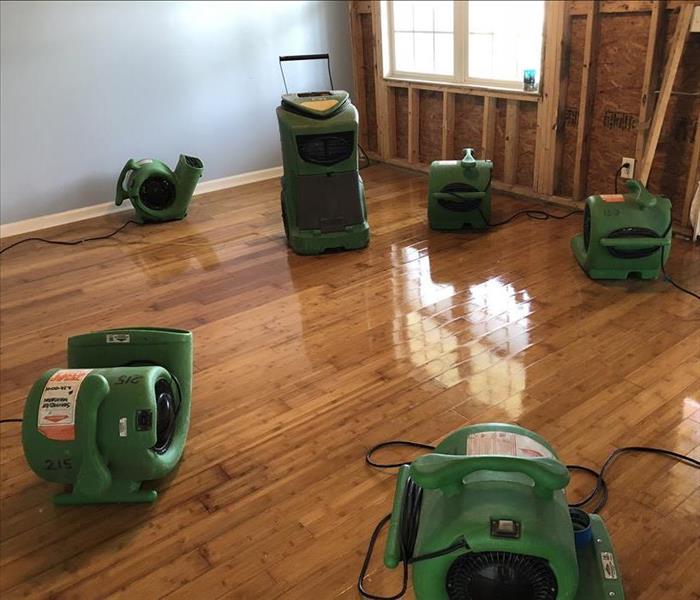 Before you start remodeling after a storm, call SERVPRO of Jacksonville Beach/Ponte Vedra to help professionally repair and restore your home!
Before you start remodeling after a storm, call SERVPRO of Jacksonville Beach/Ponte Vedra to help professionally repair and restore your home!
Remodeling after Storm Damage
If you’ve experienced storm damage from a natural disaster, the process of getting your house back to its preloss condition can be overwhelming. If you’re an optimist, you might look at this as an opportunity to renovate your space. That’s a great idea, but before you start ordering new fixtures, you’ll want to reach out to some storm damage repair companies and find one to help you make sure your home is safe and structurally sound. The faster you get a professional restoration team on the job, the less likely your home will sustain long-lasting effects from the storm. Here’s what you can expect from the process.
- If you’ve been away, prepare for a depressing sight. A natural disaster can wreak havoc on your home, so expect the damage to be dramatic. Just keep reminding yourself that once it’s done, it will be better than ever!
- Find out for sure what your insurance covers. Remodeling is an expensive endeavor. You’ll need various contractors to tackle different aspects like drywall, painting, electrical work, and so on. If, because of storm damage, roof repair is required, that’s an additional contractor and expense. Call your insurance company as soon as the damage occurs and have them send an adjuster as quickly as possible. It’s imperative for you to know exactly what will and will not be covered, and the extent of that coverage.
- The home will need to be dried out as quickly as possible. The longer a property stays wet, the more potential for damage. Standing water needs to be removed immediately, using a wet/dry vacuum, wet furnishings and carpet need to be removed, and dehumidifiers need to be utilized to dry the building further. It’s wise to contact a professional to handle this part of your storm damage repair because the situation could be extremely hazardous, especially if electrical damage is involved.
- You’ll need to have your property inspected for mold. Water left to sit on a surface for any amount of time can provide a hospitable environment for mold spores. Before you do any remodeling, have a mold inspector come to determine if there’s any dangerous mold on your property that requires remediation.
- Be prepared for it to take a long time. Try to remain patient with the process, because rushing it could end in a result that’s less than ideal. The house must be dry and clear of mold before reconstruction can even begin, and construction is a lengthy and messy process.
- Expect to make plenty of decisions. There will be negotiations with contractors, decisions to be made about materials, and so many details you’ll be exhausted. Take your time and give careful consideration to each step of the process, including upgrades you might want to make.
Before you can start remodeling after a storm, your property needs to be repaired and restored by professionals like the ones at SERVPRO of Jacksonville Beach/Ponte Vedra. Our highly-trained restoration technicians have the experience and equipment to restore your Jacksonville, Atlantic Beach, Neptune Beach, Jacksonville Beach or Ponte Vedra area property and get everything back to normal. A trusted leader in the storm damage cleanup and restoration space, we’ve served our community for more than 40 years. Call (904) 246-6118.
What is the Difference Between a Hurricane and Typhoon or Tropical Storm?
7/12/2021 (Permalink)
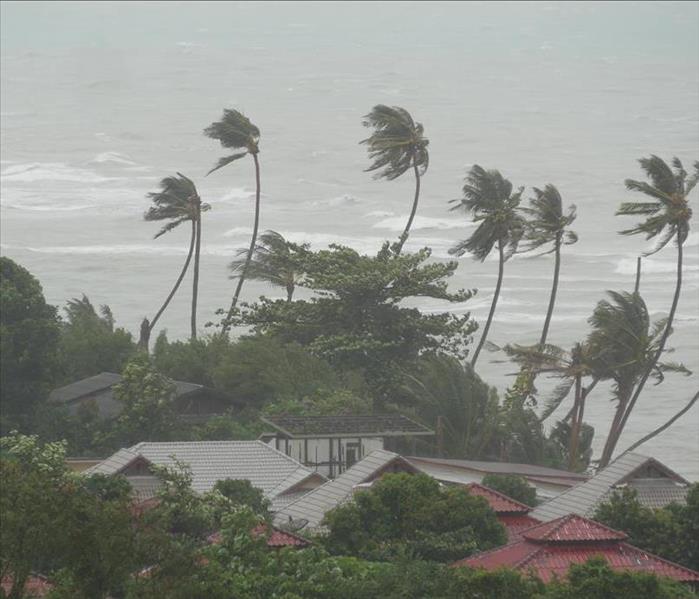 If your Beaches area home experiences damage from a storm, SERVPRO of Jacksonville Beach/Ponte Vedra will be there to help right away!
If your Beaches area home experiences damage from a storm, SERVPRO of Jacksonville Beach/Ponte Vedra will be there to help right away!
If a storm has violent winds, heavy rains, and creates a storm surge, what is it called? Is it a hurricane or a typhoon? Where do tropical storms fit into the picture? Weather terminology can be confusing, but we can help you understand the differences between these kinds of storms.
Hurricane and typhoon are two different terms for the same weather phenomenon. In short, they’re tropical cyclones, rotating, organized systems of clouds and thunderstorms that originate over tropical or subtropical waters and have closed, low-level circulation. For a storm to be considered a hurricane or a typhoon, the tropical cyclone must have 74 mph or higher sustained winds. They can occur at any time of year, but there are seasons during which these storms are most common. If the two storms are the same thing, though, why do they have different names? It has to do primarily with the location.
- Hurricanes are cyclones located in the North Atlantic Ocean, the central North Pacific Ocean, and the eastern North Pacific Ocean. They’re rated between Category 1 through Category 5 by the national hurricane center. Hurricane season runs from June 1st to November 30th.
- Typhoons are cyclones that originate in the Northwest Pacific Ocean. They are generally stronger than hurricanes, but they do less damage because of where they’re located. Typhoons commonly occur from May to October.
- In the South Pacific and Indian Oceans, they are simply called tropical cyclones. The cyclone season runs from November to April.
These types of storms form when air is heated by warm seawater, causing the air to rise quickly. As it cools down again, more warm air rises below and pushes it aside. This cycle creates strong winds, and when it happens over the sea, the result can be huge waves. Scientists believe that the intensity of hurricanes will increase in the future because the temperature of ocean water is rising.
Of course, there are different stages of storms leading up to the formation of a hurricane or typhoon. The first stage is a tropical depression, sometimes referred to as a tropical wave, disturbance, feature, or system. This is a cyclone with winds of 38 miles per hour. When a cyclone’s wind speeds reach 39 to 73 miles per hour, it becomes a tropical storm. At that point, you’ll see it on the hurricane tracker, classified on the same scale as hurricanes. The U.S. National Hurricane Center (NHC) issues advisories based on information collected through reconnaissance aircraft missions, vessels, equipment located on islands, and buoys so that people can keep track of local storms and protect their homes and businesses.
If your Northeast Florida home is damaged in a hurricane or tropical storm, call SERVPRO of Jacksonville Beach/Ponte Vedra. Our highly-trained restoration technicians have the experience and equipment to restore your Neptune Beach, Atlantic Beach, Jacksonville Beach, or Ponte Vedra home to its pre-storm condition. A trusted leader in the restoration industry, we’ve served our community for more than 40 years. Call (904) 246-6118 or contact us through our website.
Hurricane Evacuation Plan
6/23/2021 (Permalink)
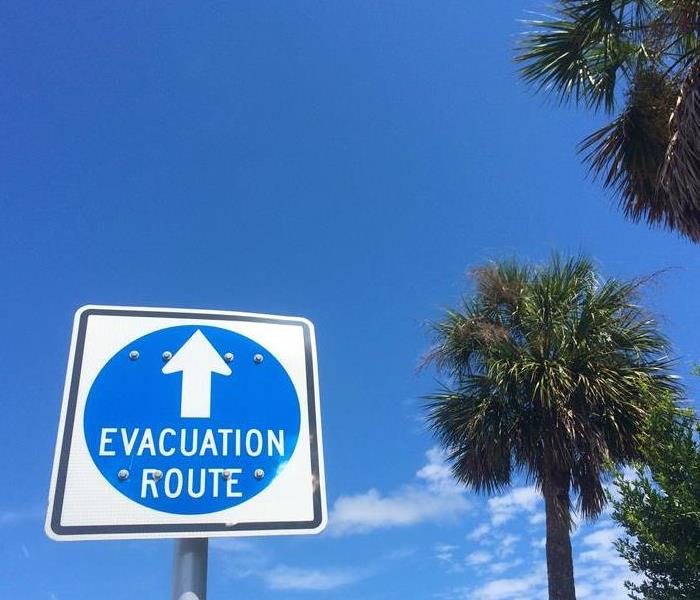 It's important to have a plan in case a storm strikes our Jacksonville Beaches area!
It's important to have a plan in case a storm strikes our Jacksonville Beaches area!
Do you have a hurricane evacuation plan? Hurricane season began June 1st and lasts until November, and if you’re near the coast, hurricane preparedness is vital for keeping your family safe. Even if you don’t think you’ll want to evacuate, there may come a time when officials make it mandatory. A Florida hurricane can quickly become dangerous, and may not leave you much time. Planning ahead will help make the experience much easier and more comfortable.
- Keep track of the local weather. Sign up for alerts from the National Weather Service so that you will know if a hurricane watch or warning is in effect for your area.
- Decide on a destination. Where will you wait out the storm? You can choose to stay with out-of-town friends or family, rent a hotel room, or stay at a local shelter, but it’s important to know where you’re going and map it out in advance. If you have pets, make sure to include them in your plans. If it’s not safe for you to be home it’s not safe for your pets. Choose a place to stay that accepts pets or make other arrangements for your furry family members.
- Pick your route and plan for detours. Your local government will offer suggested routes to make it easier to get to safety, but it’s smart to know at least three ways to get to your destination. You never know if a road is going to be blocked by flooding, a washed-out bridge, or downed trees. Throughout hurricane season, keep your gas tank full. That way you’ll be sure you have enough gas to get you where you’re going even if you run into trouble. Additionally, it will keep you out of the long lines that inevitably form at gas stations during natural disasters.
- Be thorough with emergency supplies. Keep an emergency kit in the trunk of your car with fresh water, non-perishable snacks, blankets, a phone charger, road maps, garbage bags, toilet paper, paper towels, a gas can, jumper cables, and a towline. Each family member should have a bag with changes of clothes and a copy of the evacuation plan. Additionally, have a hurricane preparedness kit that’s easy to grab, like a backpack, containing:
- Copies of important documents
- Flashlights and batteries
- Battery-powered radio
- Medications
- Cash
- Extra keys for your house and car
- Know who to call. Make plans with your family members in case you are separated. Decide upon a meeting spot or two where you will reconnect, and pick an out-of-state friend or family member to call with updates.
If your Northeast Florida home is damaged in a hurricane or tropical storm, call SERVPRO of Jacksonville Beach/Ponte Vedra. Our highly-trained restoration technicians have the experience and equipment to restore your Jacksonville, Jacksonville Beach, or Ponte Vedra home to its pre-storm condition. A trusted leader in the water restoration industry, we’ve served our community for more than 40 years. Call (904) 246-6118 or contact us through our website.
Preparing Your Home for a Hurricane
6/23/2021 (Permalink)
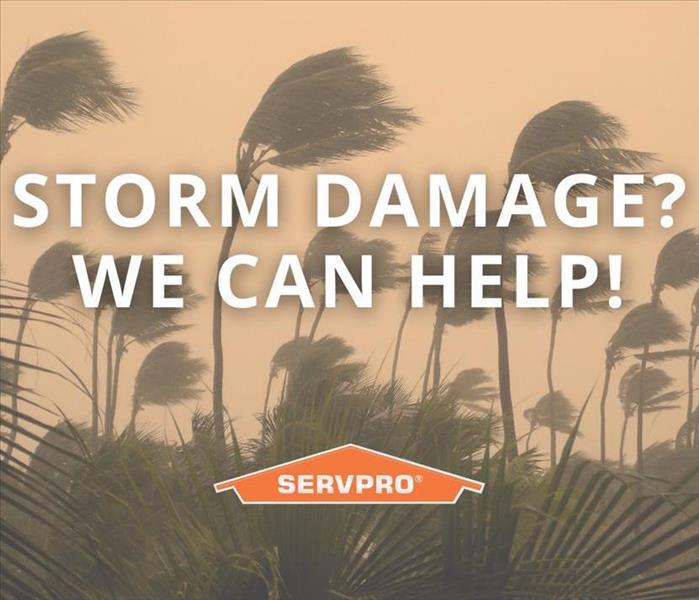 If your home experiences damage from a storm, SERVPRO of Jacksonville Beach/Ponte Vedra is here to help restore your home to pre-storm condition!
If your home experiences damage from a storm, SERVPRO of Jacksonville Beach/Ponte Vedra is here to help restore your home to pre-storm condition!
Hurricane season begins June 1st and lasts until November, and if you’re near the coast, hurricane preparedness is vital for keeping your home and family safe. Will you be ready if there’s a hurricane? Here are some steps for preparing your home.
- Make a storm kit. This kit should have supplies to get your family through 48 hours of bad conditions, with no electricity, water, or other basic services. It should have three days’ worth of water and a two day supply of food, as well other important provisions. Ready.gov offers a list of supplies here.
- Gas up your generator. If you have a 5,500 watt generator, it will require about five gallons of gasoline to run for eight hours. Fill up some gas cans so that you’ll be prepared if emergency conditions last for several days.
- Bring things inside from outside. Lawn furniture, toys, garden tools, and anything else that could be blown away in the storm should come inside. Anything you can’t bring inside should be anchored.
- Know the location of your water, gas, and electricity shut offs. After a disaster, it’s recommended that you shut off your water until you know it’s safe to drink. If your home experiences flooding or severe water damage, we recommend shutting off your electricity as well. Don’t turn off your gas until local officials tell you to do so.
- Get your windows, doors, and garage doors ready for the storm. Ideally, you’ve installed storm shutters on your windows, in which case you’ll just need to brace your doors and secure your garage door. If your windows don’t have storm shutters, plywood or other hard materials can be temporarily affixed to the exterior for protection from wind and flying objects.
- Turn down your refrigerator and freezer. Lowering your refrigerator and freezer to their lowest setting cools the food so that it will stay cold for a while if the power goes out.
- If the power goes out, unplug your electrical appliances. This will keep them from being damaged if there’s a power surge when the electricity comes back on.
- Get your insurance documents together. Your home insurance documents and other important papers should go into a waterproof bag to be kept inside your storm kit. You will need them readily available should your experience damage because they’ll make things easier in the aftermath of the storm.
- Have a plan for your pets. Your pets should be microchipped, and you should have a picture of each pet handy in case they get lost in the storm. Because emergency shelters do not always accept pets, make a plan for where they will go in an emergency if you are unable to bring them with you.
Sometimes homes sustain damage, even if you’re as prepared as possible for the storm. If your Ponte Vedra, Jacksonville Beach, Neptune Beach or Atlantic Beach home is damaged in a hurricane or tropical storm, call SERVPRO of Jacksonville Beach/Ponte Vedra. Our highly-trained restoration technicians have the experience and equipment to restore your home to its pre-storm condition. A trusted leader in the water restoration industry, we’ve served our community for more than 40 years. Call (904) 246-6118 or contact us through our website.
Acting Quickly After a Disaster
1/20/2021 (Permalink)
When a disaster strikes, it is imperative to respond quickly in order to prevent further damages and complications. Fires, Mold infestations, and Floods from broken pipes overflow or heavy storms – all such disasters must be dealt with in a timely manner. If not handled immediately you could experience on or more of these issues:
- If water-damaged structures and contents are not dried out quickly and correctly, potential health risks can develop. Mold can begin to grow within the first 24 to 48 hours after the flood.
- Excessive water can cause: rusting in metals, corrosion in electronic components, cracking, splitting, or warping of furniture items, color bleeding or transfer in fabrics, furniture stains, and secondary damage to upholstery, drapery, clothing, wallpaper, photos, and papers.
- Fire or smoke damaged properties can also experience irreversible damage, regardless of the size of the fire. Soot residue is highly acidic and can pit or corrode the metal in doorknobs, plumbing fixtures, light fixtures, etc. It can also etch glass in windows, mirrors, and cabinets, causing them to look soiled and cloudy. Moreover, plastics, appliances, fabrics, and vinyl windows can become discolored.
- The safety and security of your home can be compromised. Windows and doors may become weak and function improperly, wet materials may collapse and electrical installations and components can be a health hazard when they come in contact with water. Slips and falls are also potential dangers.
If you’re not sure how to act after experiencing water, fire, or mold problems in your home or business, contact SERVPRO of Jacksonville Beach/Ponte Vedra at 904-246-6118. We have a team of restoration professionals ready 24/7/365 to help you.
Check out our Facebook page, and like us to get additional information and storm tips.
Myths About Lightning
1/13/2021 (Permalink)
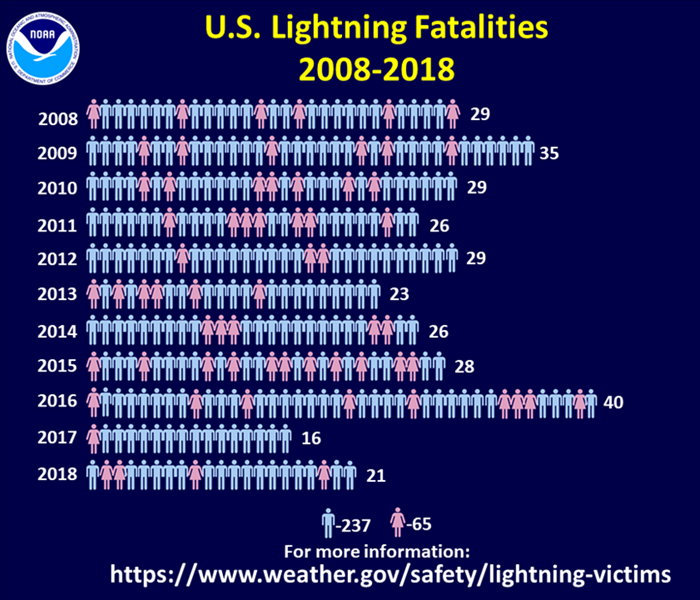 Be Smart Regarding Storm and Lightning Safety.
Be Smart Regarding Storm and Lightning Safety.
According to the US Federal Emergency Management Agency (FEMA), an average of 60 people every year are killed by lightning, and hundreds more are severely injured. Many times these injuries are due to misinformation.
Here are a few most common myths about lightning:
Myth: If it's not raining there is no danger from lightning.
Fact: Lightning can occur up to 10 miles outside of a rainstorm.
Myth: If you are inside, you are 100% safe from lightning.
Fact: A home or business is a safe place to seek shelter from a thunderstorm, as long as you avoid conduits of electricity, including phones with cords, electrical appliances, wires, TV cables, computers, plumbing, metal doors, and windows.
Myth: Lightning never strikes the same place twice.
Fact: Lightning often strikes the same place repeatedly. For example, the Empire State Building gets hit at least 100 times per year.
Myth: A lightning victim is electrified. If you touch them, you'll be electrocuted
Fact: The human body does not store electricity.
SERVPRO of Jacksonville Beach/Ponte Vedra Arrives On-Site Quickly to Minimize Storm Damage
1/13/2021 (Permalink)
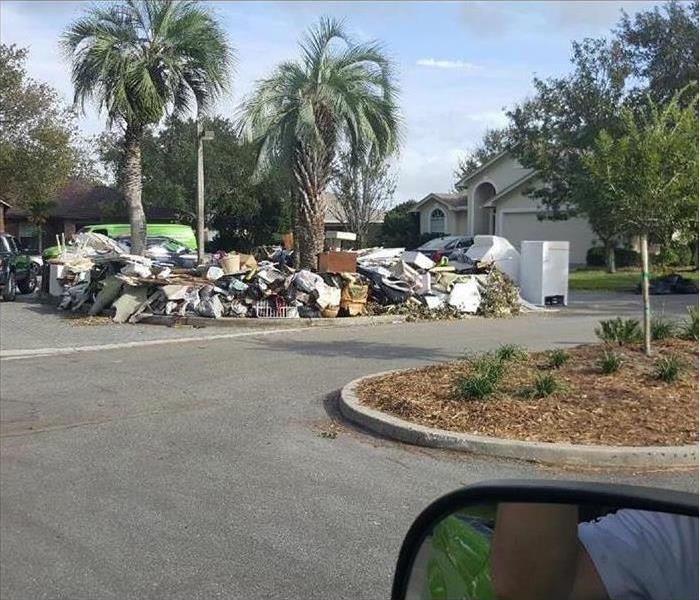 Homes in the Sanctuary community in South Jacksonville Beach were some of the hardest hit by Hurricane Matthew.
Homes in the Sanctuary community in South Jacksonville Beach were some of the hardest hit by Hurricane Matthew.
The weather can be unpredictable in Northeast Florida. You never know when a severe thunderstorm or other natural disaster is going to blow through town. Storm damage happens fast. Gusting winds knock down structures. Hail damages roofs. Lightning strikes. Debris flies into buildings. Ongoing rain floods offices. When something like this happens, choose your locally owned SERVPRO for service you can trust. For 40 years SERVPRO of Jacksonville Beach/Ponte Vedra has been serving East Jacksonville and St. Johns County communities providing fast, reliable and professional service.
Your Resource for 24/7 Emergency Support
SERVPRO of Jacksonville Beach/Ponte Vedra is on call 24 hours a day, seven days a week. That means you can call us any time, day or night when facing weather-related damage. What’s more, we will send an expert crew immediately to help. Our quick response to emergency situations not only gives you help right when you need it but also it can result in lower storm damage repair costs and/or limited contents damage for your business or home.
How Our Expert Storm Damage Restorations Solutions Work
The production team at SERVPRO of Jacksonville Beach/Ponte Vedra has the expertise and experience required to minimize potential damage and secure your property. Once you contact us about a specific natural disaster or weather damage restoration project, here is how our process works:
- A SERVPRO Production Manager or Crew Chief is on-site within one hour of your emergency call.
- Our team assesses the weather-related damages at your site.
- We create a plan for restoring your property to its preloss condition.
- We mobilize the specialized equipment required to mitigate secondary damage and loss.
- SERVPRO of Jacksonville Beach/Ponte Vedra production team monitors the situation throughout the entire restoration process.
When you need work done at your property, SERVPRO of Jacksonville Beach/Ponte Vedra stands ready to provide you fast and effective storm damage cleanup and relief. Follow us on Facebook.
City of Jacksonville Hurricane Preparedness Guide (Flooding)
6/19/2020 (Permalink)
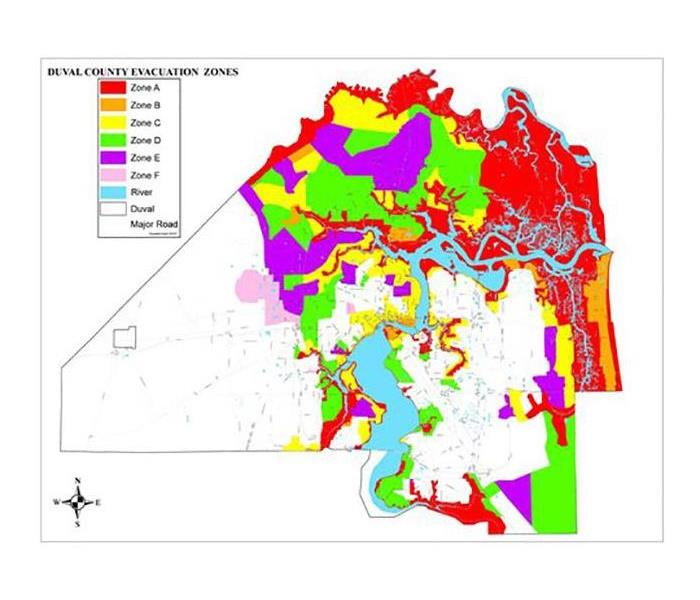 Know your Duval County Hurricane/ Flooding Evacuation Zones.
Know your Duval County Hurricane/ Flooding Evacuation Zones.
"Flooding is the most common natural disaster in the United States. With many low-lying areas, the St. Johns River, and other waterways, Duval County is always at risk for flooding regardless of whether a tropical cyclone is affecting our area. The impact of a tropical cyclone can vary depending on the amount of rainfall, wind intensity, high or low tide, storm surge, and wave characteristics. The St. Johns River flows north towards the Atlantic Ocean. As a storm approaches, water begins to back up the river, slowing down its flow into the Atlantic. When paired with high tides and rainfall, widespread flooding is a major threat.
FLOODWATER FACTS
• Six inches of moving water can knock over an adult
• Two feet of moving water can carry away most vehicles
• Floodwater can be electrically charged and very dangerous if there are downed power-lines
• Floodwater can contain debris, sharp objects, sewage, and microorganisms
• Floodwater can hide holes or other hazards under its surface"
Jacksonville Beach Families Prepare
6/1/2020 (Permalink)
Keep your family prepared in 2020 with this Emergency Checklist from our partners at the American Red Cross.
-Have a gallon of water, per person, per day on hand.
-Supply non-parishable packaged, or canned food, and include a manual can opener.
-Include blankets or sleeping bags. If your power goes out, it could get cold.
-Include first aid kits and prescription medications.
-Include a battery powered or crank radio, flashlight, and plenty of extra batteries. If piecing a kit together from last year, make sure your batteries are not corroded or expired.
-Credit cards, cash, and car keys are important items to keep close by. Also fill up all vehicles with gas ahead of time.
-List of family physicians and their contact information.
-Special items for infants, the elderly, and disabled family members.
Storm Damage, Do You Have a Plan?
5/30/2020 (Permalink)
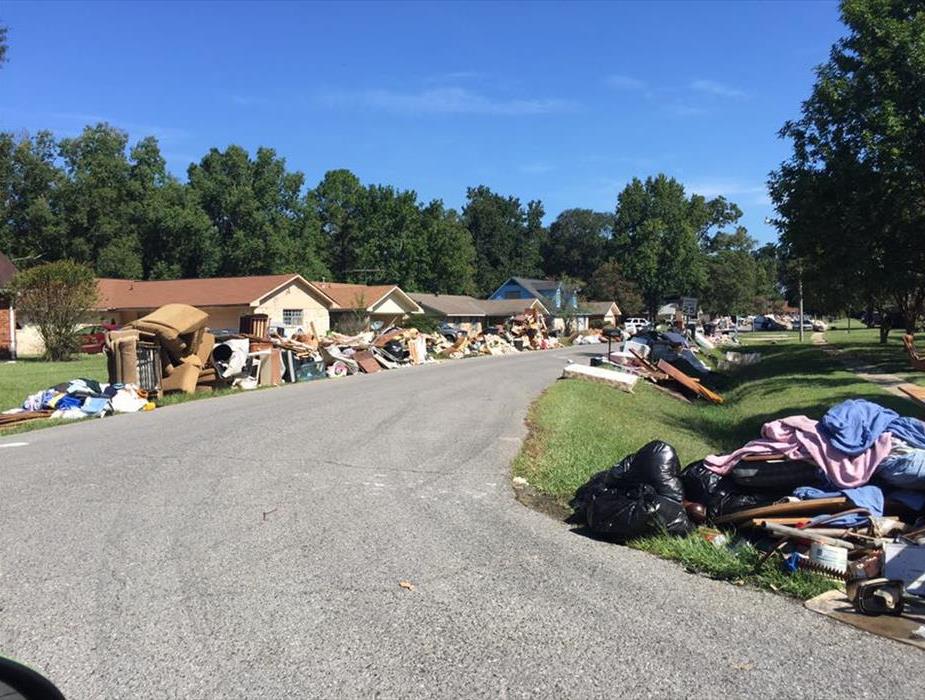 Piles of storm debris from flooding in Louisiana line the streets of neighborhoods. Our SERVPRO franchises travelled to assist local franchises.
Piles of storm debris from flooding in Louisiana line the streets of neighborhoods. Our SERVPRO franchises travelled to assist local franchises.
With Storm Season right around the corner, SERVPRO of Jacksonville Beach/Ponte Vedra wants to make sure you have a plan!
"What would your family do? Would you know where to meet?" Talk to your family about these important issues! You never know when a disaster could strike.
It is important at least once a year to get together with your family and come up with a plan. The following is a list of some important things to consider when getting you family's plan in place.
-"Where will we meet if our neighborhood is evacuated, or we are not allowed to go home by law enforcement?"
-"Is there a trusted neighbor, friend, or relative that can pick up the kids if parents can not get to them? Are they already on the pre-approved pick-up list for that child's school?"
-"Do you have a list of medications handy, and are they up to date which prescriptions filled regularly? This includes pets as well."
-"Make a list of shelters that allow pets ahead of time, and have a plan in place for pets if you cannot get them to a shelter. If you are staying with a relative, make sure your pet can come to, and purchase supplies ahead of time so your pet will be comfortable on a spare of the moment road trip."
-"If you have an elderly family member/friend, or a special needs family member/friend in an assisted living facility, learn that facility's evacuation plan and ask questions. Will they provide transportation for that family member, or will you need to get them? What would you do if you couldn't get to them, or got separated?"
-"Make a disaster kit! If you are riding out a disaster or are in a voluntary evacuation zone, you could be without water or power for days. Include water, non-perishable food, first aid kit, medications, pet supplies and pet food, flashlights, batteries, crank radio, wet wipes, and cleaning supplies you don't need water to use. Ever toilet paper and paper towels are also a good idea. Fill up your bath tub with water before disaster strikes so you can use that water to flush your toilets."
Hurricane Season
9/24/2019 (Permalink)
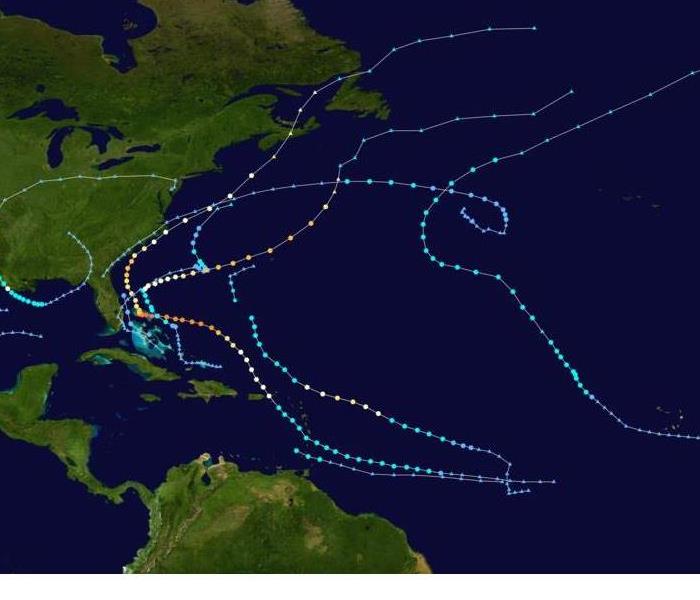 2019 Hurricane Season
2019 Hurricane Season
The National Hurricane Center (NHC) forecasts each hurricane season based on probability, but of course there is no reliable way to accurately predict when and where a hurricane will reach land.
According to the NHC, it’s nearly impossible to determine a storm’s approach any sooner than 5 or 7 days in advance – a fact that is not very reassuring if you’re planning a trip months (or even weeks) in advance.
Official Hurricane Season Dates
The full hurricane season is June 1st to November 30th for the Atlantic and the Caribbean each year, and the Eastern Pacific hurricane season starts in mid-May.
What months have the most hurricanes?
The peak months for hurricanes in the Atlantic, Caribbean, and Pacific are August through early October.
The peak months for hurricanes in the southern hemisphere (Australia, New Zealand, and Hawaii) are March and April.
What months have the fewest hurricanes?
The months before and after the peak months, specifically May, June, July, and November, are the least active for hurricanes in the Atlantic, Pacific, and the Caribbean. While these are the ‘least active’ months for hurricanes, it’s still possible for a hurricane to occur during these months.
Tropical depressions vs. tropical storms vs. hurricanes
Hurricanes develop after going through the following stages:
- Tropical wave – the most common tropical disturbance characterized by wind speeds of less than 30 miles per hour and winds in every direction.
- Tropical depression – an organized system of clouds and thunderstorms with definite counterclockwise motion and maximum sustained winds of 38 miles per hour or less.
- Tropical storm – another organized system of strong thunderstorms and definite counterclockwise motion, but maximum sustained wind of 39-73 miles per hour.
A tropical storm becomes a hurricane when sustained winds reach 74 miles per hour or higher.
Facts About Hurricanes
8/1/2019 (Permalink)
Did You know that.....
A hurricane is an intense tropical storm with powerful winds and rain.
Other names for a hurricane include cyclone, typhoon and tropical storm.
While they are essentially the same thing, the different names usually indicate where the storm took place. Tropical storms that form in the Atlantic or Northeast Pacific (near the United States) are called hurricanes, those that form near in the Northwest Pacific (near Japan) are called typhoons and those that form in the South Pacific or Indian oceans are called cyclones.
Hurricanes usually form in tropical areas of the world.
Hurricanes develop over warm water and use it as an energy source.
Hurricanes lose strength as they move over land.
Coastal regions are most at danger from hurricanes.
As well as violent winds and heavy rain, hurricanes can also create tornadoes, high waves and widespread flooding.
Hurricanes are regions of low atmospheric pressure (also known as a depression).
The wind flow of hurricanes in the southern hemisphere is clockwise while the wind flow of hurricanes in the northern hemisphere is counterclockwise.
Weather in the eye of a hurricane is usually calm.
The eye of a hurricane can be anywhere from 2 miles (3.2 kilometres) in diameter to over 200 miles (320 kilometres) but they are usually around 30 miles (48 kilometres).
The winds around the eye of a hurricane are usually the strongest.
Hurricanes can be tracked by weather satellites and weather radar closer to land.
Hurricanes have led to the death of around 2 million people over the last 200 years.
The 1970 Bhola Cyclone that struck Bangladesh killed over 300000 people.
In 2005 Hurricane Katrina killed over 1800 people in the United States and caused around $80 billion dollars worth of property damage. The city of New Orleans was hit particularly hard with levee breaches leading to around 80% of the city being flooded.
After the Storm: How to Check Your Property for Damage
7/1/2018 (Permalink)
The Importance of Conducting a Storm Damage Inspection
As summer ushers in warmer temperatures, it can also bring with it heavy rains, strong winds and powerful storms. While your home protects you from the wrath of Mother Nature, it should also be thoroughly checked for problems after every storm.
You may not have reason to suspect that your home has been damaged by a passing storm. However, once the inclement weather has safely passed, it’s important to look over the dwelling for any issues. This is also a great time to make emergency repairs and assess if an insurance claim is needed.
The following is a handy storm checklist from the National Storm Damage Center:
Roof
The roof is typically one of the most vulnerable areas during a storm. Hail, wind, rain and debris can adversely impact it. The following indicators can help in your assessment:
• Holes or tears in the roof
• Split seams
• Lost or missing shingles
• Ceiling or roof leaks
The Exterior of the Dwelling
Materials such as brick, siding and stucco are usually heavy and durable. However, during a storm, they can withstand significant damage. In some cases, problems may not be noticed until it’s too late to file an insurance claim, so you need to be diligent in your determination:
• Chipping, cracking, dents and dings are obvious signs that there is a problem. Even if your siding appears to be fine at first, you want to check it at varying times of the day. Different stages of lighting can showcase problems that you may have missed.
• Small or large holes in the stucco. No matter if the hole is small or large, this is a serious issue for a homeowner. If you find a hole or blemish, a knowledgeable and trustworthy company such as SERVPRO can conduct a thorough inspection of the property.
• Damaged tuck pointing and brick. Brick is a solid material when it comes to homes. However, it should be thoroughly checked for problems following a storm.
• Detached or ruined gutters, trim, downspouts, etc. Gutters, trim, downspouts and other exterior materials on a home are instrumental in its protection. If anything is out of sorts, it should be immediately repaired.
Driveways, Walkways, and Porches
Concrete can split, chip and crack with continuous storms and rain. This can reduce the lifespan of your walkway driveway or porch. To alleviate a safety issue, you’ll want to assess it for any imperfections.
Trees and Fallen Limbs
According to the National Storm Damage Center, fallen trees and branches can cause billions of dollars in damages every year. Most property owners would handle the removal of debris, even if the limbs or trees came from your neighbor’s property. Your insurance company may help in the retrieval of the costs, but it’s dependent on the type of policy and circumstances surrounding the incident.
Basic Tips
• Severe storms may knock down power and electrical lines. If this occurs on your property, you’ll want to cordon off the area approximately 30 feet in various directions from the fallen line. It’s also important to call the power company and 911 immediately.
• After a storm, you also want to assess the remainder of your property including fences, air-conditioning units, caps, vents etc. If your vehicle was left out of the garage, it would also need to be checked over for damage.
• Crawl spaces and basements should be looked over for water or flooding.
Document as much of the damage as possible by taking photos at various angles.
Finally, it’s important to comprehend your homeowner’s coverage, limits, and deductibles before a problem occurs. In case something happens, you’ll be thoroughly prepared for any storm or disaster. Should you need any help with water or storm damage or clean-up call the professionals from SERVPRO of The Beaches/Ponte Vedra, 904-246-6118.
2018 City of Jacksonville, Hurricane Preparedness Guide (Tornadoes)
6/11/2018 (Permalink)
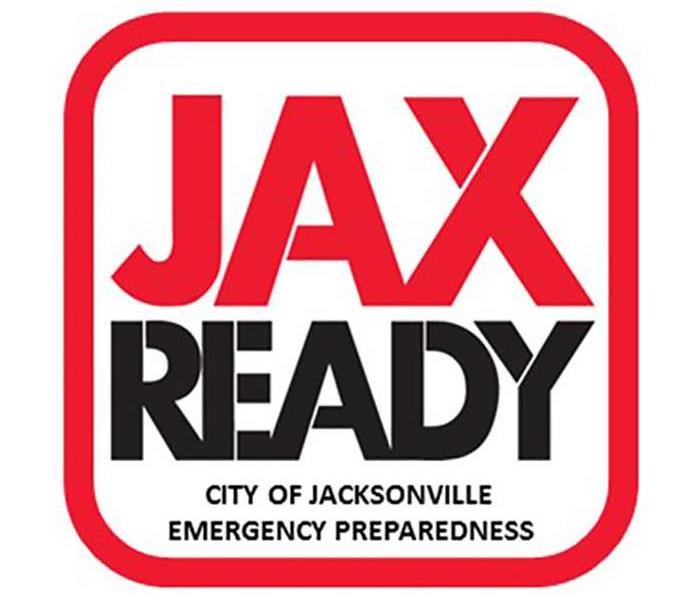 Be #JaxReady this Hurricane Season, and remember SERVPRO of The Beaches/Ponte Vedra is #HereToHelp.
Be #JaxReady this Hurricane Season, and remember SERVPRO of The Beaches/Ponte Vedra is #HereToHelp.
"A Tornado is a column of violently rotating air that extends from a thunderstorm to the ground. Lightning and hail are common in thunderstorms that produce tornadoes. The extent of destruction caused by a tornado depends on its intensity, size, path, and amount of time it is on the ground. If a tornado warning is issued and you are in a mobile home, vehicle, or outdoors, get to the closest substantial shelter. Move to an interior room on the lowest level of a sturdy building.
TORNADO WATCH: Storm conditions indicate tornadoes are possible in your area. Monitor radio and television reports for further updates.
TORNADO WARNING: A tornado has been sighted or indicated by weather radar. Proceed to safe shelter immediately."
For more information about Tornado safety visit: http://www.coj.net/departments/fire-and-rescue/emergency-preparedness.aspx
2018 City of Jacksonville, Hurricane Preparedness Guide (Thunderstorms & Lightning)
6/4/2018 (Permalink)
 Duval County/City of Jacksonville 2018 Hurricane Preparedness
Duval County/City of Jacksonville 2018 Hurricane Preparedness
Thunderstorms can develop any time of the year in Duval County, but are most frequent in late spring through early fall (before and after summertime). On average, Florida has 1.45 million lightning strikes per year, as ALL thunderstorms produce lightning.
During a thunderstorm, you should take the following precautions:
• Go inside or seek shelter immediately
• Avoid objects that conduct electricity
• Get as far away from water as possible
• Avoid high ground and open areas
Thunderstorm Risk Categories:
1 - MARGINAL (MRGL) Isolated severe storms possible Limited in duration and/or coverage and/or intensity
• Winds 40-60 mph
• Hail up to 1”
• Low tornado risk
2 - SLIGHT (SLGT) Scattered severe storms possible Short-lived and/ or not widespread, isolated intense storms possible
• One or two tornadoes
• Reports of strong winds/wind damage
• Hail ~1”, isolated 2”
3 - ENHANCED (ENH) Numerous severe storms possible More persistent and/or widespread, a few intense
• A few tornadoes
• Several reports of wind damage
• Damaging hail, 1-2”
4 - MODERATE (MDT) Widespread severe storms likely Long-lived, widespread and intense
• Strong tornadoes
• Widespread wind damage
• Destructive hail, 2”+
5 - HIGH (HIGH) Widespread severe storms expected Long-lived, very widespread and particularly intense
• Tornado outbreak
• Derecho (widespread, long-lived wind storms)
Check out the 2018/2019 City of Jacksonville, Hurricane Preparedness Guide for more information.
Faster to Any-Sized Disaster
4/14/2018 (Permalink)
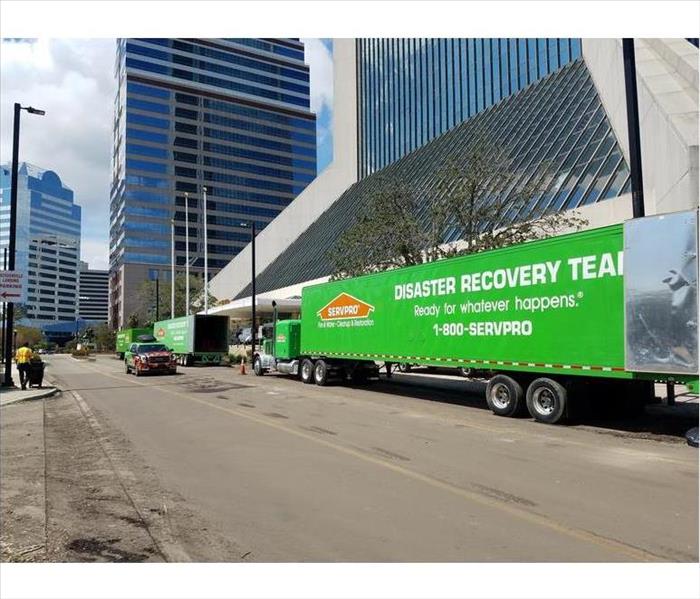 SERVPRO Crews From Saginaw, Michigan Help Local Franchises Dry Out the Wells Fargo Building in Downtown Jacksonville After Hurricane Harvey.
SERVPRO Crews From Saginaw, Michigan Help Local Franchises Dry Out the Wells Fargo Building in Downtown Jacksonville After Hurricane Harvey.
Not just a catchy tag line, the commitment from SERVPRO of The Beaches/Ponte Vedra is to be there when you need us most!
Whether you are a home or business is facing disaster, SERVPRO of The Beaches/Ponte Vedra is equipped to deal with fire, flood, and widespread disaster. The National SERVPRO System has resources in place to respond quickly and effectively. SERVPRO's National Resort Team is always posed, ready to back up our local franchise, just like in the case of Hurricane Matthew in October of 2016. SERVPRO professionals from Macon, Georgia, Sarasota, Florida, Bay County, Florida, Lakeland, Florida came to work with our crews directly, while SERVPRO storm teams from Mobile, Alabama came to help the customers we just couldn't reach. When a whole city seams affected, SERVPRO can handle anything.
Be Flood-Smart!
4/11/2018 (Permalink)
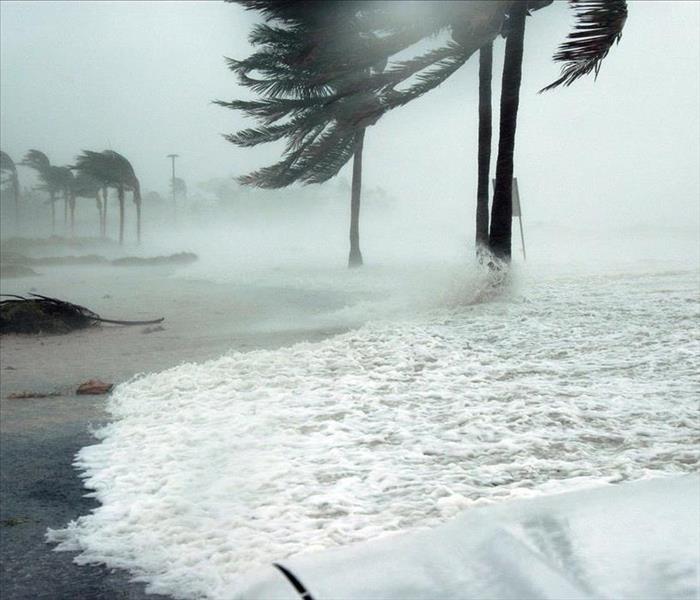 Be Safe During Flooding, call SERVPRO of The Beaches/Ponte Vedra if you Experience Flood Damage, 904-246-6118.
Be Safe During Flooding, call SERVPRO of The Beaches/Ponte Vedra if you Experience Flood Damage, 904-246-6118.
Summer Storms are coming soon, and SERVPRO of The Beaches/Ponte Vedra wants you to be safe.
Floods are the most common, widespread disasters in the United States. Whether your home or business is near a coastline, along city streets, in the mountains, near a river or even out in the desert -there is always potential for flood damage. Floodsmart.gov reports that in the last 5 years, all 50 states have experienced floods or flash floods. Just because you haven't experienced a flood in the past, does not mean you never will. 20% of flood insurance claims come from low-risk or no-risk areas (floodsmart.gov). On average, floods cost $3.5 billion in annual losses in the United States.
According to the American Red Cross (ARC), floods cause more damage in the US every year than any other type of disaster.
-Stay away from flood waters. If the water is up above your ankles, "turn around, don't drown."
-If you approach a flooded road while driving, turn around and go the other way. If you get caught on a flooded road and water is rising quickly around you, get out of the car and go the higher ground as fast as you can.
-KEEP CHILDREN OUT OF THE WATER!
If a flood does strike your home or business in Atlantic Beach, Neptune Beach, Ponte Vedra Beach, or Jacksonville Beach contact SERVPRO of The Beaches/Ponte Vedra at 904-246-6118. Even a few inches of water have the potential to cause major damage to any structure.
Need-To-Know, Tornadoes
4/11/2018 (Permalink)
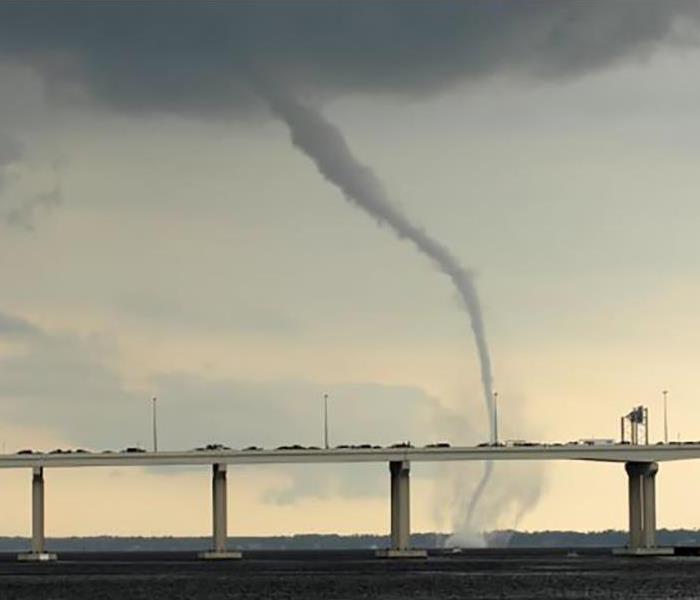 Have Storm Damage? Call SERVPRO at Jacksonville's Beaches, 904-246-6118.
Photo Credit: Florida Times-Union
Have Storm Damage? Call SERVPRO at Jacksonville's Beaches, 904-246-6118.
Photo Credit: Florida Times-Union
Tornadoes are known to cause widespread damage throughout the United States, especially in the Southern Plains and SouthEast. But how much do we truly know about these destructive entities that tear through our homes and businesses?
Here are a couple of quick facts about tornadoes:
- The average tornado travels Southwest to Northeast but have been known to move in any direction.
- Tornadoes are most likely to occur between 3pm and 9pm but can occur at any time.
- T. Theodore Fujita devised the F0-F5 Scale for tornadoes in 1971.
- A tornado normally appears transparent until it picks dust and mud from the ground.
- In 2006 the National Weather Service unveiled the Enhanced Fujita Scale (EF Scale).
- In the southern hemisphere tornadoes usually rotate in a clockwise direction. In the northern hemisphere tornadoes usually rotate in a counterclockwise direction.
- The USA averages around 1,200 tornadoes every year, more than any other country.
Signs of Danger
- Dark, green tinted sky
- Low-lying rotating cloud
- Large hail
- Loud roar similar to a freight train
We are in the peak of storm season here in NorthEast Florida and encourage everyone to be weather aware. Have a family plan in the event of a tornado warning. Know where your safe areas are, wherever you are.
Have Storm Damage? Call SERVPRO of The Beaches/Ponte Vedra – 904-246-6118
September is National Preparedness Month
8/30/2017 (Permalink)
September is National Preparedness Month! SERVPRO of The Beaches/Ponte Vedra wants to incourage individuals, families, businesses and communities to take action! This is an ideal time of year for individuals and families to update their emergency supply kits and family emergency plans, and to become better informed about different threats and local emergency plans. Many things can change over the course of a year, and it is imperative that the entire family have the most up-to-date emergency contact information, and plan in place as they head back to school and work. It’s about talking to your family and figuring out what you should do if an emergency happens in your community. Where will you meet if you get separated, and cell phones are down? What emergency supplies will you need and where should you keep them?
One simple thing that individuals and families can do to be prepared, is to have a family emergency plan. To develop one you should ask yourself some important questions, such as: “In the event of an emergency, is there a safe place for my family to meet?” This is especially important if you aren’t allowed back into your home or neighborhood by local law enforcement or the National Guard. “What is the evacuation location and plan of my child’s school? Does everyone in the family have one another’s contact information, and the contact for an out-of-town relative to take roll-call?”
One of our missions at SERVPRO® of The Beaches/Ponte Vedra has always been to contribute to the communities where we live and work. This month we have an extraordinary opportunity to make a difference by joining forces with companies and communities throughout Northeast Florida to help prepare our families, friends, colleagues, neighbors and communities for emergencies. Whether they are naturally occurring or man-made.





 24/7 Emergency Service
24/7 Emergency Service


















